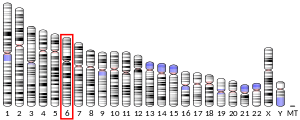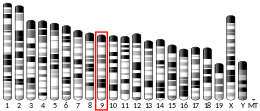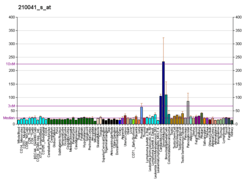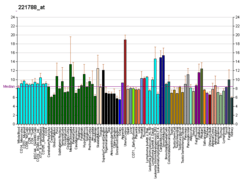Phosphoglucomutase 3
Phosphoacetylglucosamine mutase is an enzyme that in humans is encoded by the PGM3 gene.[5][6][7]
Clinical significance
Mutations in PGM3 are associated to congenital disorder of glycosylation .[8]
References
- 1 2 3 GRCh38: Ensembl release 89: ENSG00000013375 - Ensembl, May 2017
- 1 2 3 GRCm38: Ensembl release 89: ENSMUSG00000056131 - Ensembl, May 2017
- ↑ "Human PubMed Reference:".
- ↑ "Mouse PubMed Reference:".
- ↑ Pang H, Koda Y, Soejima M, Kimura H (Aug 2002). "Identification of human phosphoglucomutase 3 (PGM3) as N-acetylglucosamine-phosphate mutase (AGM1)". Ann Hum Genet. 66 (Pt 2): 139–44. doi:10.1017/S0003480002001033. PMID 12174217.
- ↑ Li C, Rodriguez M, Banerjee D (Apr 2000). "Cloning and characterization of complementary DNA encoding human N-acetylglucosamine-phosphate mutase protein". Gene. 242 (1–2): 97–103. doi:10.1016/S0378-1119(99)00543-0. PMID 10721701.
- ↑ "Entrez Gene: PGM3 phosphoglucomutase 3".
- ↑ Stray-Pedersen, A; Backe, P. H.; Sorte, H. S.; Mørkrid, L; Chokshi, N. Y.; Erichsen, H. C.; Gambin, T; Elgstøen, K. B.; Bjørås, M; Wlodarski, M. W.; Krüger, M; Jhangiani, S. N.; Muzny, D. M.; Patel, A; Raymond, K. M.; Sasa, G. S.; Krance, R. A.; Martinez, C. A.; Abraham, S. M.; Speckmann, C; Ehl, S; Hall, P; Forbes, L. R.; Merckoll, E; Westvik, J; Nishimura, G; Rustad, C. F.; Abrahamsen, T. G.; Rønnestad, A; et al. (2014). "PGM3 Mutations Cause a Congenital Disorder of Glycosylation with Severe Immunodeficiency and Skeletal Dysplasia". The American Journal of Human Genetics. 95: 96–107. doi:10.1016/j.ajhg.2014.05.007. PMC 4085583. PMID 24931394.
Further reading
- Chen SH, Anderson JE, Giblett ER, Stamatoyannopoulos G (1978). "Isozyme patterns in erythrocytes from human fetuses". Am. J. Hematol. 3: 23–8. doi:10.1002/ajh.2830030103. PMID 203189.
- Yoshida H, Abe T, Nakamura F (1979). "Studies on the frequencies of PGM1, PGM3 and Es-D types from hair roots in Japanese subjects and the determination of these types from old hair roots". Forensic Sci. Int. 14 (1): 1–7. doi:10.1016/0379-0738(79)90150-6. PMID 468082.
- Marshall MJ, Neal FE, Goldberg DM (1980). "Isoenzymes of hexokinase, 6-phosphogluconate dehydrogenase, phosphoglucomutase and lactate dehydrogenase in uterine cancer". Br. J. Cancer. 40 (3): 380–90. doi:10.1038/bjc.1979.192. PMC 2010033. PMID 508567.
- Cantu JM, Ibarra B (1982). "Phosphoglucomutase: evidence for a new locus expressed in human milk". Science. 216 (4546): 639–40. doi:10.1126/science.6461922. PMID 6461922.
- Maruyama K, Sugano S (1994). "Oligo-capping: a simple method to replace the cap structure of eukaryotic mRNAs with oligoribonucleotides". Gene. 138 (1–2): 171–4. doi:10.1016/0378-1119(94)90802-8. PMID 8125298.
- Suzuki Y, Yoshitomo-Nakagawa K, Maruyama K, et al. (1997). "Construction and characterization of a full length-enriched and a 5'-end-enriched cDNA library". Gene. 200 (1–2): 149–56. doi:10.1016/S0378-1119(97)00411-3. PMID 9373149.
- Mio T, Yamada-Okabe T, Arisawa M, Yamada-Okabe H (2000). "Functional cloning and mutational analysis of the human cDNA for phosphoacetylglucosamine mutase: identification of the amino acid residues essential for the catalysis". Biochim. Biophys. Acta. 1492 (2–3): 369–76. doi:10.1016/S0167-4781(00)00120-2. PMID 11004509.
- Strausberg RL, Feingold EA, Grouse LH, et al. (2003). "Generation and initial analysis of more than 15,000 full-length human and mouse cDNA sequences". Proc. Natl. Acad. Sci. U.S.A. 99 (26): 16899–903. doi:10.1073/pnas.242603899. PMC 139241. PMID 12477932.
- Mungall AJ, Palmer SA, Sims SK, et al. (2003). "The DNA sequence and analysis of human chromosome 6". Nature. 425 (6960): 805–11. doi:10.1038/nature02055. PMID 14574404.
- Ota T, Suzuki Y, Nishikawa T, et al. (2004). "Complete sequencing and characterization of 21,243 full-length human cDNAs". Nat. Genet. 36 (1): 40–5. doi:10.1038/ng1285. PMID 14702039.
- Gerhard DS, Wagner L, Feingold EA, et al. (2004). "The status, quality, and expansion of the NIH full-length cDNA project: the Mammalian Gene Collection (MGC)". Genome Res. 14 (10B): 2121–7. doi:10.1101/gr.2596504. PMC 528928. PMID 15489334.
This article is issued from
Wikipedia.
The text is licensed under Creative Commons - Attribution - Sharealike.
Additional terms may apply for the media files.





